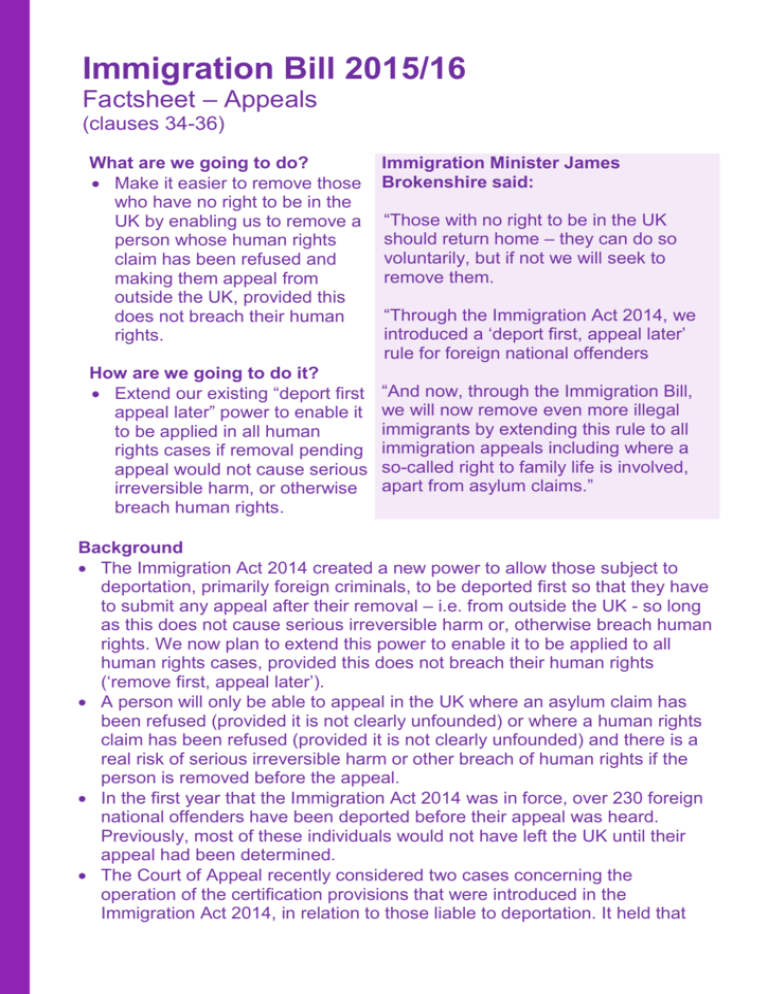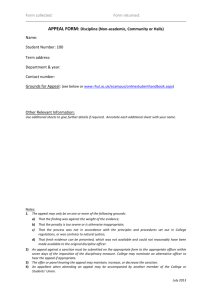Appeals: factsheet
advertisement

Immigration Bill 2015/16 Factsheet – Appeals (clauses 34-36) What are we going to do? Make it easier to remove those who have no right to be in the UK by enabling us to remove a person whose human rights claim has been refused and making them appeal from outside the UK, provided this does not breach their human rights. How are we going to do it? Extend our existing “deport first appeal later” power to enable it to be applied in all human rights cases if removal pending appeal would not cause serious irreversible harm, or otherwise breach human rights. Immigration Minister James Brokenshire said: “Those with no right to be in the UK should return home – they can do so voluntarily, but if not we will seek to remove them. “Through the Immigration Act 2014, we introduced a ‘deport first, appeal later’ rule for foreign national offenders “And now, through the Immigration Bill, we will now remove even more illegal immigrants by extending this rule to all immigration appeals including where a so-called right to family life is involved, apart from asylum claims.” Background The Immigration Act 2014 created a new power to allow those subject to deportation, primarily foreign criminals, to be deported first so that they have to submit any appeal after their removal – i.e. from outside the UK - so long as this does not cause serious irreversible harm or, otherwise breach human rights. We now plan to extend this power to enable it to be applied to all human rights cases, provided this does not breach their human rights (‘remove first, appeal later’). A person will only be able to appeal in the UK where an asylum claim has been refused (provided it is not clearly unfounded) or where a human rights claim has been refused (provided it is not clearly unfounded) and there is a real risk of serious irreversible harm or other breach of human rights if the person is removed before the appeal. In the first year that the Immigration Act 2014 was in force, over 230 foreign national offenders have been deported before their appeal was heard. Previously, most of these individuals would not have left the UK until their appeal had been determined. The Court of Appeal recently considered two cases concerning the operation of the certification provisions that were introduced in the Immigration Act 2014, in relation to those liable to deportation. It held that the Government are generally entitled to proceed on the basis that an outof-country appeal would be a fair and effective remedy. Key Questions and Answers What is serious irreversible harm? All cases must be given individual consideration. The Home Office has published guidance on how to apply the test (https://www.gov.uk/government/publications/certification-guidance-for-non-eeadeportation-cases-section-94b) The guidance gives the following example of where serious irreversible harm could result: • the person is the sole carer of a child who is at school and the child would have no choice but to accompany the parent to live abroad until any appeal is concluded, resulting in a significant interruption to the child’s education. Are you planning to separate families? The effect on the family will be considered and some may be separated. The best interests of children in the UK are a primary consideration in any immigration decision, including in deciding whether to certify under the new power. What safeguards are in place to ensure that people are not placed at risk of serious irreversible harm? The decision to certify that a person would not face a real risk of serious irreversible harm is made after consideration of all the facts put forward by the person. A decision to certify under the new power may be challenged by judicial review. Where a judicial review claim is made removal is normally suspended pending a decision on permission. How many appeals have been allowed under the existing “deport first, appeal later” provisions? Between July 2014-June 2015, over 230 foreign national offenders were removed under these powers and 67 lodged an appeal, of which three have been determined and were dismissed. In addition, over 1,200 EEA foreign national offenders were removed under equivalent powers and 288 lodged an appeal. Home Office December 2015 2









